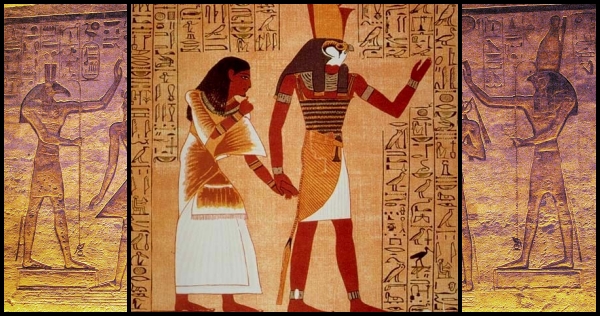More Egyptian connections in Hamlet besides Herod tale
During the season (and "twelve days") of Christmas, it may be good to consider Egyptian connections in Shakespeare’s Hamlet.
Prince Hamlet references “Herod,” one of whom (Herod the Great) supposedly precipitates the flight of Mary, Joseph, and Jesus into Egypt after Joseph was warned in a dream.
Some Christians take this story as historically true, while others think the writer of the Matthew gospel wished to paint Jesus as a new Moses, so the story may likely be religious fiction that attempts to make a point for the sake of religious instruction (catechesis).
Herod wishes to eliminate his successor, foreseen in prophecy, like Laius getting rid of his son Oedipus, and Claudius arranging for the death of Prince Hamlet.
But the Egyptian connection may be much older than Herod. As some students and scholars of comparative literature have already noticed, the oldest sources for Shakespeare's Hamlet may be Egyptian, and much older than Saxo Grammaticus (1200 CE).
Here's Jenny Wade on an Egyptian tale that sounds more than a bit like Shakespeare's Hamlet:
"Isis bears Osiris's posthumous son, the sky-god Horus, who traditionally avenges his father’s murder through a series of battles with his uncle Set [....]
In one of their fights, Horus castrates Set, who was perceived to be a god of chaotic sexual power and indiscriminate desire, thus negating much of his force. Ultimately the tribunal of gods rule in Horus's favor because of his string of triumphs over his uncle, so Horus becomes the tutelary god of Egypt in his father’s place." [1]
The Isis-Osirus-Horus-Set tales date at least to 2040-1674 BCE.
We might also notice here echoes of the Greek legend of Clytemnestra and her son Orestes/Horestes, where the gods rule in favor of Orestes instead of siding with the furies; but the Greek tale dates only to the 5th century BCE.
Scott Foran notes that Shakespeare may have become familiar with the Isis-Osirus-Horus-Set tale from translations of Plutarch or of The Golden Ass. Foran deals with Jung's idea of the shadow, and Shakespeare's Hamlet explores something similar in that the avenging son first becomes a killer of a father (Polonius), so at least in part, the enemy he seeks to punish in the "other," Claudius, is like a part of himself. [2]
How old is the story on which Shakespeare's Hamlet is based? Saxo Grammaticus is often claimed to be the original source because of its many specific similarities. Few would dispute that. But there are similarities in tales from other cultures, with similar themes running like threads that connect them, regardless of Shakespeare's possible familiarity with the tales, or lack thereof.
~~~~~~~~~~~~~~~~~~~~~~~~~~~~~~
NOTES: All references to Hamlet are to the Folger Shakespeare Library online version: https://shakespeare.folger.edu/shakespeares-works/hamlet/entire-play/
[1] Wade, J. (2019). The castrated gods and their castration cults:
Revenge, punishment, and spiritual supremacy.
International Journal of Transpersonal Studies, 38(1),
Advance online publication, page 3.
https://digitalcommons.ciis.edu/cgi/viewcontent.cgi?article=1011&context=advance-archive
See also
The Greco-Egyptian origins of western myths and philosophy.
Louise Muller (2018) In Pius Mosima (ed.), Papers in Intercultural Philosophy and Transcontinental Comparative Studies. Hoofddorp, Nederland: pp. 251-281.
https://philarchive.org/archive/MULTGO-13
[2] Scott Foran
https://www.academia.edu/75557217/Horus_and_Hamlet_The_Motif_of_Hostile_Brothers_as_Individuation
~~~~~~~~~~~~~~~~~~~~~~~~~~~~~~
IMAGES:
Center: Egyptian God Horus, 13th century BCE, public domain via
https://commons.wikimedia.org/wiki/File:Horus.jpg
Left and Right: The gods Seth (left) and Horus (right) [...] in the small temple at Abu SimbelDetail (split), 1279-1213 B.C.E. Public domain via https://en.wikipedia.org/wiki/File:SethAndHorusAdoringRamsses_crop.jpg
~~~~~~~~~~~~~~~~~~~~~~~~~~~~~~~
~~~~~~~~~~~~~~~~~~~~~~~~~~~~~~~
INDEX OF OPHELIA POSTS:
My 2023 series on Ophelia, and earlier Ophelia posts:
https://pauladrianfried.blogspot.com/2023/10/index-of-ophelia-posts-2023-series-and.html
~~~~~~~~~~~~~~~~~~~~~~~~~~~~~~~
~~~~~~~~~~~~~~~~~~~~~~~~~~~~~~~
YOU CAN SUPPORT ME on a one-time "tip" basis on Ko-Fi:
https://ko-fi.com/pauladrianfried
IF YOU WOULD PREFER to support me on a REGULAR basis,
you may do so on Ko-Fi, or here on Patreon:
https://patreon.com/PaulAdrianFried
~~~~~~~~~~~~~~~~~~~~~~~~~~~~~~~
~~~~~~~~~~~~~~~~~~~~~~~~~~~~~~~
Disclaimer: If and when I quote or paraphrase bible passages or mention religion in many of my blog posts, I do not intend to promote any religion over another, nor am I attempting to promote religious belief in general; only to explore how the Bible and religion influenced Shakespeare, his plays, and his age.
~~~~~~~~~~~~~~~~~~~~~~~~~~~~~~~~~~~~~~
~~~~~~~~~~~~~~~~~~~~~~~~~~~~~~~~~~~~~~
Thanks for reading!
~~~~~~~~~~~~~~~~~~~~~~~~~~~~~~~~~~~~~~
~~~~~~~~~~~~~~~~~~~~~~~~~~~~~~~~~~~~~~
My current project is a book tentatively titled Hamlet’s Bible, about biblical allusions and plot echoes in Hamlet.
Below is a link to a list of some of my top posts (“greatest hits”), including a description of my book project (last item on the list):
https://pauladrianfried.blogspot.com/2019/12/top-20-hamlet-bible-posts.html
I post every week, so please visit as often as you like and consider FOLLOWING.
To find the FOLLOW button, go to the home page: https://pauladrianfried.blogspot.com/
see the = drop-down menu with three lines in the upper left.
From there you can click FOLLOW and see options.


Comments
Post a Comment